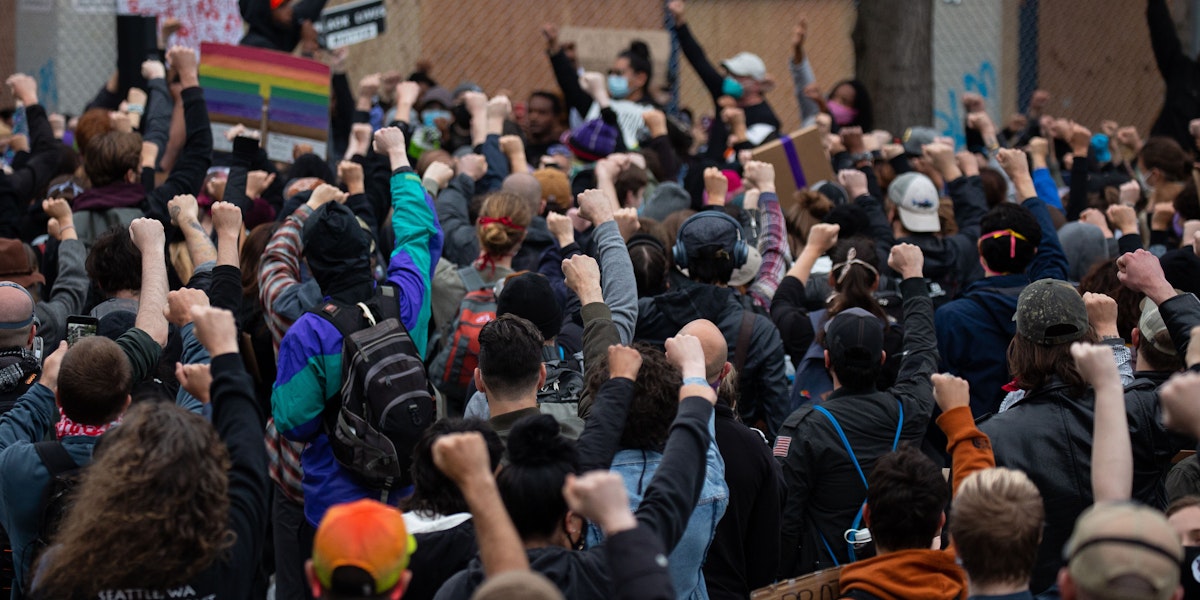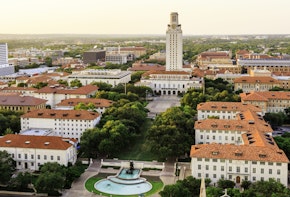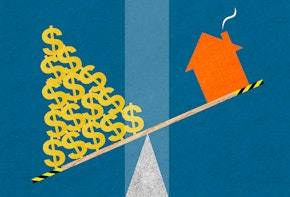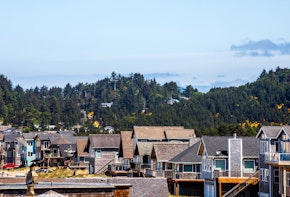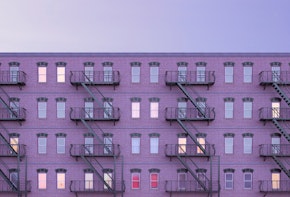All of us at The Century Foundation mourn the death of George Floyd, and the countless other Black Americans who have lost their lives at the hands of law enforcement and racial violence in this country.
Below is a compilation of personal reflections and comments from TCF staff and researchers on the death of George Floyd and the nationwide protests against racial inequality that followed.
We Do Not Consent
by Mark Zuckerman, president
Since May 25, the day George Floyd was murdered by police, hundreds of thousands of Americans have taken to the streets, led by a new, diverse generation of activists. They are teaching the nation a masterclass in democracy, and demanding that America make good on its unrealized promises—a country of justice for all, shared prosperity and power, free of deeply entrenched racism and police brutality.
This generation understands that our nation’s moral legitimacy rests on the consent of the governed, and they do not consent to a government that has failed to account for 400 years of violence against Black Americans.
They do not consent to structural racism in our criminal justice systems that has too often led to the killing of innocent Black men like George Floyd.
They do not consent to an electoral system that tramples on the voting rights of Black and Brown and Native and poor Americans.
They do not consent to a health care system that exacerbates shameful racial disparities in access to and quality of care.
They do not consent to public school systems and housing policies that perpetuate segregation and belie the notion of equal opportunity beginning at birth.
They do not consent to a higher education system rooted in exclusionary admission practices and rife with financial roadblocks for people of color and low-income students.
They do not consent to government inaction in the face of devastating climate change. To xenophobic immigration policies. To laws that determine your worth based on who you love or how you identify.
They do not consent to an economic system that propagates extreme levels of wealth and income inequality. To weak labor laws that too often deny workers a voice on the job. To wage levels that relegate working families and children to poverty.
This generation is calling for a remedy of America’s original sin of slavery, of opression, of discrimination, of injustice, and of crushing economic and cultural exclusion.
Racism, racial violence, and police brutality are the shameful truths of the American experience. To confront these legacies, we must first acknowledge them honestly, and then work to actively rid them whenever and wherever they manifest.
Speaking of honesty, white Americans must hold ourselves accountable for advancing racial justice and confronting racism. We must all take responsibility to prevent discrimination and oppression of our fellow Black Americans. History is judging our complicity.
Being a Black Person Is Not Exhausting, Anti-Blackness Is
by Michelle Burris, senior policy associate
I did not learn the joy of being Black until attending college. I attended Spelman, a historically Black college where women students had been on the front lines of the Civil Rights Movement (CRM), and the college’s chapel laid Martin Luther King Jr. in repose. Although rigorous, my K–12 schooling experience provided a distorted curriculum of Black history. There were two chapters on slavery and the CRM. There were complete omissions of Black women freedom fighters such as Septima Clark and Fannie Lou Hamer. The lack of Black historical literacy in K–12 schools does all students a disservice and underscores the necessity of having culturally affirming curriculums. I could not think of a better time than now to teach this material, after students, especially Black ones, have watched the traumatic videos and learned about the murders of George Floyd, Breonna Taylor, Ahmed Arbery, and Tony McDade in one month.
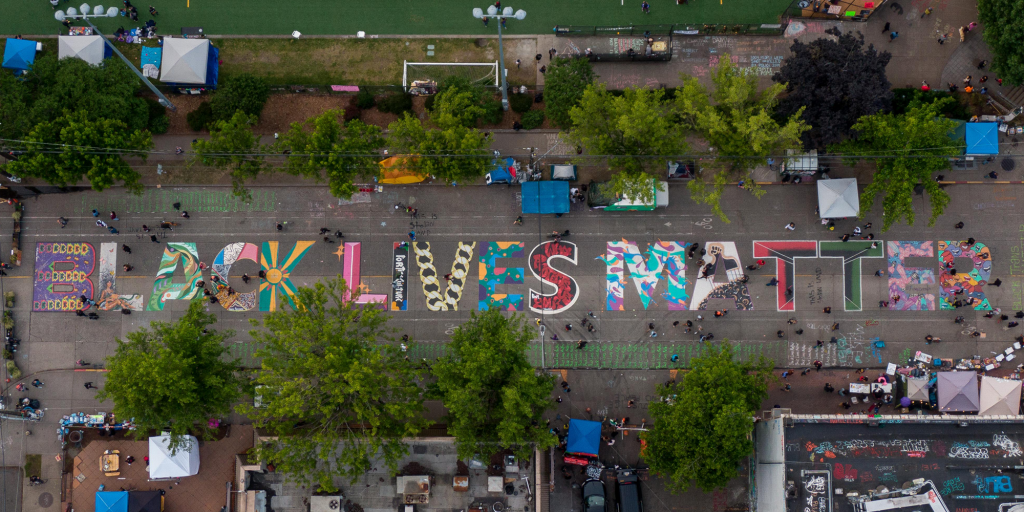
These murders left me exhausted, until I realized that it is not my skin color that is the problem, but rather the degrading and abusive treatment my community receives as a result of our skin color—what scholars call anti-Blackness. And it was anti-Blackness that took away Mr. Floyd’s life, as well as the lives of many others. The light that I hope comes from this current darkness is that we teach students how to disrupt anti-Blackness. We need to teach Black students not only that their history is much more than pain and enslavement, but also that they can become activists to combat the anti-Blackness that led to these murders. We need to teach them to be civically engaged, and to use their voices to speak out against racial injustices. As Takeima Bunche-Smith says “We need to center the full humanity, joy, culture and strengths of Black people 365 days a year, while highlighting the unjust systems as well.” Teaching Black students only about racist murders traumatizes them, and leaves their education incomplete. Educators must do better.
George Floyd’s murder at first had me asking myself, “What more I can do?” Then I remembered: I am still an educator. One tweet I read in particular sparked this revelation: “Black lives do not only matter in retrospect.” My hope, as an educator, is to continue fighting anti-Blackness by centering the full humanity, joy, culture, and strengths of Black people, and to amplify the pedagogies of other teachers who do so as well. My hope is to teach Black students that they are worthy, brilliant, and loved. Gianna Floyd said, “My dad changed the world.” I hope, after the cameras are gone, Mr. Floyd will continue to change the world, and America will finally do right by Black people and affirm our humanity.
Reparations
by Andrew Stettner, senior fellow
The murder of George Floyd and the unprecedented and inspiring waves of protest that followed demand not only immediate action by policymakers but also deep reflections among all Americans about the depths of anti-black racism. For liberal economic policy thinkers, it means putting a far higher priority on the issue of reparations.
For too long, progressives—myself included—have not expended as much energy on reparations as we have on other major progressive economic priorities, such as the minimum wage, organizing rights, health care, and cash transfers. The thrust of progressive economic policy has been on universal policies that would, in many cases, disproportionately benefit black Americans who bear the brunt of economic inequality. This includes policies that embrace the idea of race-conscious universalism, as coined by Darrick Hamilton, which design universal policies that attack structural racism. An example is baby bonds, which would transfer wealth to all children at birth, and be a powerful way to get at the gaping black–white wealth gap that makes a mockery of America’s supposed promise of economic opportunity and mobility.
Such universal policies could be a part of the solution to the issue of structural racism, but they do not obviate the need for a process of reparations. As Sandy Darity put it in his testimony to Congress at a historic hearing for H.R. 40, a bill proposing a reparations commission, “A policy of reparations is a set of compensatory policies for grievous injustice. The three goals of a reparations plan should be 1. acknowledgement, 2. redress, and 3. Closure.” As stated in H.R. 40, reparations is a conscious process that wrestles and measures the unique legacy and consequences of the Transatlantic slave trade on African Americans, and policies after emancipation that “continued to brutalize and disadvantage African-Americans, including share cropping, convict leasing, Jim Crow, redlining, unequal education, and disproportionate treatment at the hands of the criminal justice system.” If we don’t examine this specific problem, we will never find the solutions. As David Swinton, former President of Benedict college concludes, “equality is not likely to be obtained without some form of reparations.”
Reparations is a challenging process that forces America to look straight at and acknowledge the central role of anti-black racism in the American experience, which, like atrocities committed against Native Americans, has never been addressed in any significant way. Too many liberal activists and politicians have avoided the topic of reparations because it has been, in the past, unpopular with white voters—but also because discussing reparations pushes deeply into the racism ingrained in American hearts, and in our society. If white progressives, myself included, truly want to right the wrong of America’s original sin, however, we all will need to do an even better job of centering the experiences of black Americans in our thinking, and to creating more space for black leadership.
Now is the time to change that. If there has ever been a moment when millions of Americans of all races have awoken to America’s need to blot out the stain of anti-black racism, it is now. Moreover, as a product of the COVID-19 pandemic, progressives (and conservatives) are showing a new willingness to go directly at economic problems with the elixir of cash. Rather than relying simply on generations-long strategies, such as improvements in education or entrepreneurial training, there is a recognition that we need to directly treat the harm caused by modern capitalism—poverty and inequality—with cash. And, there is a realization that when we do so, it leads to long-term benefits for the communities currently being left out of America’s prosperity. This realization has given rise to the movement for a cash child allowance (endorsed by nearly all Demcoratic members of Congress), for a universal basic income, and the aforementioned baby bonds. Most visions of reparations would include a direct cash or wealth transfer to individual African Americans and to the communities where they live. With the growing acceptance of the elixir of cash as a solution to social problems, the moment has come for a serious move toward reparations. Let’s all stand—with black leaders in Congress, in policy circles, and in the streets—for the cause.
Weaponized Privilege
by Pat Kozu, chief operating officer
It is oppressive enough to witness, let alone be subjected to, persistent incidents where weaponized privilege results in harassment, terror, incarceration, injury, or death. Security checks, 911 calls, and vigilantism are tools used to demarcate spaces where Whites alone are entitled to feel safe and comfortable. Everyday places—retail stores, parks, public streets, college campuses, and Starbucks coffee shops—are not welcoming to Blacks when they are profiled as not belonging. Ubiquitous memes show Central Park Amys, Barbecue Beckys, and Golf Course Kens summoning 911, security guards, or store managers to police their privilege. The resulting effect is equivalent to utilizing burning crosses and lynchings to enforce racial segregation by perpetuating racial anxiety, trauma, and death. The consequences are no different than when the KKK rush in to save the honor of a White person allegedly brushed by a Black person while walking down the street.
This atmosphere breeds zealous overpolicing and vigilantism against any real or imagined crime, no matter how petty or imaginary. It’s contagious and fickle. Some of the current administration’s first acts involved banning Muslims. Later, it was about stopping immigrants trying to cross the southern border or looking like they might have. More recently, this otherizing focused again on Asian Americans, this time accused of spreading COVID-19. All these pernicious acts go on while Blacks continue to be targeted for just living.
These attitudes and attacks have far-reaching impact. None of us can remain silent about matters of racism. We who have not lived while Black, no matter how woke we think we are, must first listen, learn, and empathize. We each must take responsibility and do our part to dismantle racist infrastructure and privilege. These many, many forms of violence affect our collective health, security, and well-being. Nothing is too small to address; nothing is too big. It’s insidious and pervasive and must be rooted out. We can tackle this collectively: ensure voter rights; offer access to quality, affordable housing; employ just hiring practices; support organizations that are addressing racial justice; vote to fund quality, affordable education; stop policies which lead to health and environmental inequities; reform the criminal justice system; facilitate redress and reparations; and of course, show up, be humble, and be an ally. This is no time to be a spectator.
Getting at the Roots of Racism
by Richard D. Kahlenberg, senior fellow
To Valerie Castile, the mother of Philando Castile, the picture of Minneapolis police officer Derek Chauvin kneeling on George Floyd’s neck reminded her of a hunter on top of a deer he had slain. “He’s sitting on that man like he done killed his prize trophy.”
White dehumanization of black people has been a throughline in American history since the first enslaved African was brought to this country in chains. In more recent years, the fundamental social architecture that has supported this dehumanization has been segregation. White supremacists fostered elaborate systems of separating African Americans and whites—an American version of apartheid that goes under the sanitized term, “Jim Crow”—as a way to demean and devalue black lives.
Although the legal regime has been formally dismantled, segregated patterns and their dehumanizing impact have proven highly durable. While the civil rights revolution half a century ago accomplished important victories in the areas of politics and the military, as the eminent sociologist Orlando Patterson recently noted, efforts to reduce segregation in housing and education remain the unfinished business of the civil rights movement. Indeed, according to a 2016 report from the Government Accountability Office, the percentage of schools in which 75–100 percent of students were low-income and black or Hispanic grew from 9 percent in 2000–01 to 16 percent in 2013–14.
In the wake or George Floyd’s execution, police reform is agenda item number one. But America must also think more broadly about dismantling the segregation that nourishes the white attitudes that devalue the humanity of black people.
In education, we need a bold agenda for school integration, one that includes $500 million in new Title I funding for school diversity measures, federal pre-clearance of any efforts by school districts to secede, passage of the Strength in Diversity Act for voluntary integration, and a doubling of federal support for magnet schools.
In housing, we need to supplement the 1968 Fair Housing Act with new legislation to curtail exclusionary zoning laws that prohibit the construction of smaller, more affordable multifamily housing in large swaths of America. Single-family zoning laws were passed not long after racial zoning was struck down by the courts in order to exclude black families and other families of modest means. Such laws have been called “the new redlining,” and have no place in a society committed to opportunity across racial and economic lines.
Political opinions on race are shifting. Now is the moment to go beyond bland corporate statements about the value of black lives to enact legislative reforms that show we mean it.
The Weight of the Issue
by Stefan Lallinger, fellow
One of the feelings I have found hard to convey, as a black person in this country and as someone who has been racially profiled by certain police officers throughout his adult life, is how exhausting and weighty this all is. The barrage of images in the media trigger unpleasant personal memories. There is one memory, in particular, that always stays with me.
In the summer of 2016, shortly after we got married, my wife Vanessa and I took a honeymoon out of the country. It was not only supposed to be a chance for us to celebrate our union, but also a much-needed escape from the constant reminders of the perils of living as black people in America, as the time was marked by a spate of deaths of black people in police custody. Any relief we had was short-lived, however. While we were in Colombia, my phone blew up with notifications. Alton Sterling had just been killed by police in Baton Rouge, less than an hour from the school where I was the principal, and my social networks were buzzing with activity and plans for action. The very next day, Philando Castile was killed by a police officer, and the heart-wrenching video of his partner and daughter was released. My wife and I—on our honeymoon—watched from our hotel room in Colombia with horror and grief.
The following evening, as we were in a public square watching street performers, I was blatantly racially profiled and subsequently detained by two police officers. Because Vanessa was in front of me and captivated by the performance, I had to call out her name multiple times before she turned around and could see what was happening to me. When she turned around, my hands were on my head, and I was being searched by uniformed police officers. Instant mortification fell across her face, and she started to cry and yell at the same time, her emotions undoubtedly heightened by the tragedies we were still processing. I will never forget the look she had in that moment—it is the same look I have seen on the faces of countless black mothers, wives, sisters, and daughters. If the look had words, they would be “your life is in danger and in this moment, we are helpless; you better not leave me.”
It is Vanessa’s terrified, tear-filled countenance that appears in my head whenever I forget my license, go over the speed limit, lose a receipt in-store, attend a rally, or do any mundane thing that might lead to an encounter with police. Her worry carries even more weight now that I am a father to a ten-month old daughter. Being bombarded with images of police violence always brings me back to that place.
All that being said, I applaud the desire for change that I feel in this moment in America. I feel hopeful; this time does feel different—although time will tell exactly how different. No matter what happens though, or how many kind and decent police officers I encounter, I fear I’ll never be able to shake the look from my mind. That is the weight that I find hard to explain.
Racism, 1950s to the Present
by Jeff Madrick, senior fellow
I had the good fortune to have a great elementary school teacher who made us very aware of racial prejudice in the United States. It was only a few years after the Supreme Court’s 1954 Brown v. Board. of Education decision. Governor Orval Faubus tried to keep African American students out of the newly integrated public schools in Arkansas, and Republican President Eisenhower sent in the troops to let those students in.
The 1950s were the beginning of my awareness of racism. I went to my first civil rights march—one in Washington, D.C., sponsored by the NAACP—in 1957, when I was 11, as part of a contingent from the Ethical Culture school in Manhattan. (The elementary school I attended, however, was in legally segregated Levittown.) The leading civil rights voice then was A. Phillip Randolph. I read later that Martin Luther King spoke at the 1957 march, though I don’t remember hearing him. Some 25,000 people marched to the Washington monument. That same year, one of my teachers, Ed Grossman, had our class do a play on segregation. A couple of us interviewed Jackie Robinson, the baseball great, for the play.
King organized his famed march on D.C. in 1963, when he made his famous “I Have a Dream” speech. There were 250,000 marchers in 1963—ten times that of the 1957 march. Two years later, in 1965, the “Bloody Sunday” march for voting rights, from Selma to Birmingham, took place, when so many were brutalized by the police.
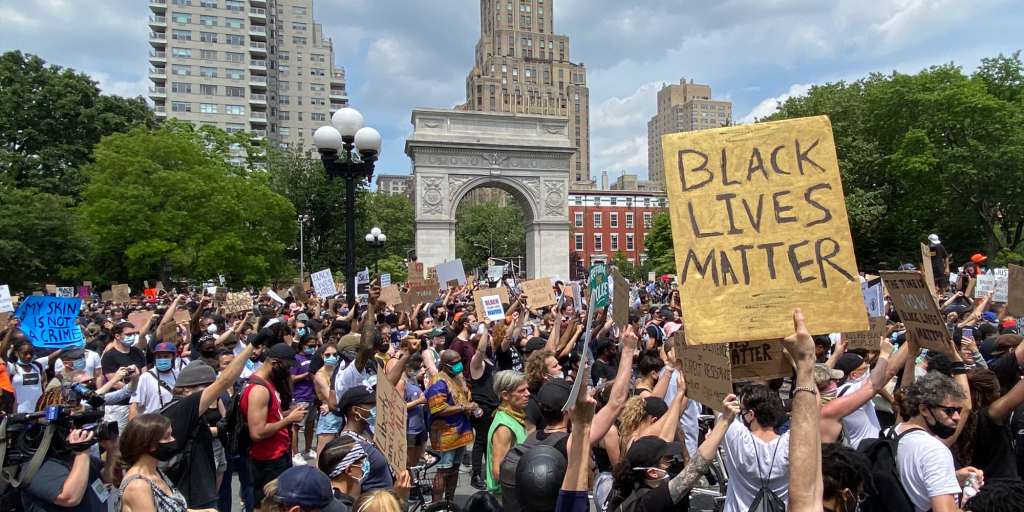
These protests were part of great national unrest. President Kennedy tried to get King not to hold his 1963 march, for fear of backlash. By 1964, there were riots in Harlem and Detroit, and eventually Los Angeles, Newark, and elsewhere. Hundreds died.
But these protests also provoked federal legislation. Under President Johnson, the Civil Rights Act was passed, and later the Voting Rights Act, all while Johnson was conducting his War on Poverty. This legislation mattered. Johnson also sponsored affirmative action (Kennedy had only passingly advocated it.) Poverty fell sharply until the early 1970s, but then began to rise again under Reagan.
After my early experiences, I always retained deep concerns about poverty and prejudice, reporting on it later for various publications, and NBC News. My partner in those years, a black woman who worked at NBC, adopted a boy from Hale House, for whom I served as a surrogate father. We were like so many who took care of children of color, constantly worried he’d be swept up off the streets by the police.
Public policy addressing racial inequality from the 1980s onward has been execrable. Affirmative action was gradually ended. The acquittal of the officers who participated in the horrid beating of Rodney King was shockingly unjust, and welcomed by too many. I reported on the riots that ensued for NBC News. Instead of introducing salutary legislation, the country took a sharp turn to the right in the 1990s, passing the 1994 crime bill as well as welfare reform in 1996 that required work without providing a jobs program. There is almost no welfare in America today.
During this time, people had the audacity to say things had gotten better for blacks. This was hardly true. Incarceration rates and police force expansion rose sharply in the 1990s with the unnecessary and fraudulent war on drugs. How can one say it was better for blacks, with so many young black men and women soon headed for prison on minor offenses? The black unemployment rate remains twice as high today as the white unemployment rate. The black population has virtually no wealth.
In my work now, I am devoting particular attention to U.S. child poverty—the highest rate in the rich world—that disproportionately affects children of color. I have a chapter in my new book, Invisible Americans, on the role of racism in keeping child poverty rates up.
I am modestly hopeful that witnessing of the torture and murder of George Floyd has now led to a serious new phase in policy. Imagine what would have happened to the prosecution of these officers, had there been no serious protests. Now, however, focus must be on legislation that makes police brutality a federal crime and can focus economic resources much more comprehensively on poor people of color.
Counselors Not Cops
by Halley Potter, senior fellow
The brutal murders of George Floyd and Breonna Taylor, along with the loss of too many other black people at the hands of the police, have spurred a new movement to radically rethink the role that police play in American society. This conversation needs to include our schools.
Nearly half of all U.S. high schools have some form of school police. While many of these school resource officer programs were started with an ostensible mission of improving relations between police departments and the community, the presence of police in schools today often goes hand in hand with passing through metal detectors, sweeps of student lockers, searches by drug-sniffing dogs, and school-based arrests. During the 2015–16 school year, nearly 300,000 students were referred to law enforcement or arrested for an incident that took place at school. At least sixty-two violent assaults against students—like 14-year-old Shakara, 16-year-old Essence, and 12-year-old Tyrese—were perpetrated by school police between 2009 and 2018. These punitive and negative interactions with school police disproportionately impact black students, who are three times as likely as other students to attend a school with more security staff than mental health professionals. Just 15 percent of the overall student population is black, but 31 percent of students involved in school-based law enforcement referrals are black. Not surprisingly, while a majority of white students report feeling safer in the presence of police, a majority of black students say that they do not.
The policing of black students in this country is not accidental. It is an extension of both oppressive criminal justice policies that target black and brown communities as well as the persistent segregation of our public schools. A week before George Floyd was murdered marked the sixty-sixth anniversary of Brown v. Board of Education, the Supreme Court decision ruling that state laws establishing racial segregation in public schools are unconstitutional. And yet, as of 2018–19, roughly 40 percent of black students attended a school with almost no white students, and roughly 20 percent of white students attended a school with almost no students of color. The heavy presence of police in majority-black schools, and the disproportionate impact of this policing on black students, is an outgrowth of this segregation.
In Minneapolis, Denver, Seattle, Chicago, New York City, Houston, Raleigh, and other communities across the country, leaders and activists—many themselves students of color—are calling for police-free schools, with counselors not cops. The Minneapolis school board has listened. Others should, too.
American Promise, American Perjury
by Conor P. Williams, fellow
Progressive philosopher Richard Rorty opened his book Achieving Our Country with a concise summary of the core challenge any activist faces: “National pride is to countries what self-respect is to individuals, a necessary condition for self-improvement.” Meaningful progress toward justice requires a critique and subsequent conflict, but also a commitment to the collective project citizens share. This tension has especially bedeviled progressives, who have historically been defined by our insistence that the American present is not good enough. How can we hold our country to account for its sins without despairing that that country is irredeemable?
This is particularly difficult in times, like today, when we raise critiques about membership: who, precisely, counts as part of our country? Who are we, and how do we treat one another? In the past several weeks, thousands of Americans have taken to the streets to decry police violence, yes; but more fundamentally, to insist that black lives matter. The protests are underscoring that, for too long and in too many ways, black Americans have been denied full and fair participation in American life.
George Floyd’s tragic death was only the latest catalyst of this critique. For centuries, black Americans—from Frederick Douglass to Ida B. Wells to James Baldwin—have charged that the country has left them out of its democratic credo. Martin Luther King, Jr. made the most prominent version of this claim in his 1963 speech during the March on Washington, noting that the American founding offered “a promise that all men—yes, black men as well as white men—would be guaranteed the unalienable rights of life, liberty, and the pursuit of happiness. It is obvious today that America has defaulted on this promissory note insofar as her citizens of color are concerned.”
What he then said is enormously important. King continued: “But we refuse to believe that the bank of justice is bankrupt.”
What comes next today, in 2020, is as yet unclear. Many protestors have charged that the United States is, at its core, a white supremacist nation, a country whose systems, structures, and institutions are deeply—perhaps irredeemably—racist.
It is hard to disagree. This country has enslaved black Americans, resisted their efforts to vote, limited their mobility, blocked them from neighborhoods and schools, excluded them from public benefits, and disparately targeted them for incarceration on a massive scale. The United States has given black Americans every reason to abandon it—and white Americans have shown only begrudging interest in noticing, let alone paying, our deep moral debts.
As a white, male American, I’ve joined the protests because I’m complicit in that delinquency. But I’ve also joined because, as a progressive, I believe that nothing threatens the stability of American democracy as gravely as moral perjury. Our country’s vaunted founding principles are only as good as their daily application. Right now, black Americans have made it clear that the country’s promises of liberty, equality, and justice do not always reach their daily lives. An America that cannot—or will not—respond to the injustice of flagrant police violence against black Americans should not be surprised to find a shortage of national pride in its public institutions in the future.
Is America Bringing Its Wars Home?
by Amanda Novello, senior policy associate
As the nation mourns the life taken from George Floyd, Breonna Taylor, and countless others, many are awakening to the complex realities that serve as the battleground for the on-going fight for black lives. All Americans need to reflect on their role in this fight—are you more interested in perpetuating white supremacy and anti-black violence, or dismantling it? But, just as with other systemic issues, such as climate change, individual action is not enough: we need to dismantle institutions that are disproportionately responsible, namely a militarized police force.
Faced with stunning accounts of police brutality circulating over the past week (largely toward peaceful protestors), the question arises: Why do our nation’s police look like the military at war? This is the case not just in a few cities, but across the entire nation, made clear by images of urban police departments wearing desert camo pouring in. And, after nearly two decades of unjust wars against brown people abroad, it’s unsettling to see local police departments pursue that same power dynamic on our own streets.
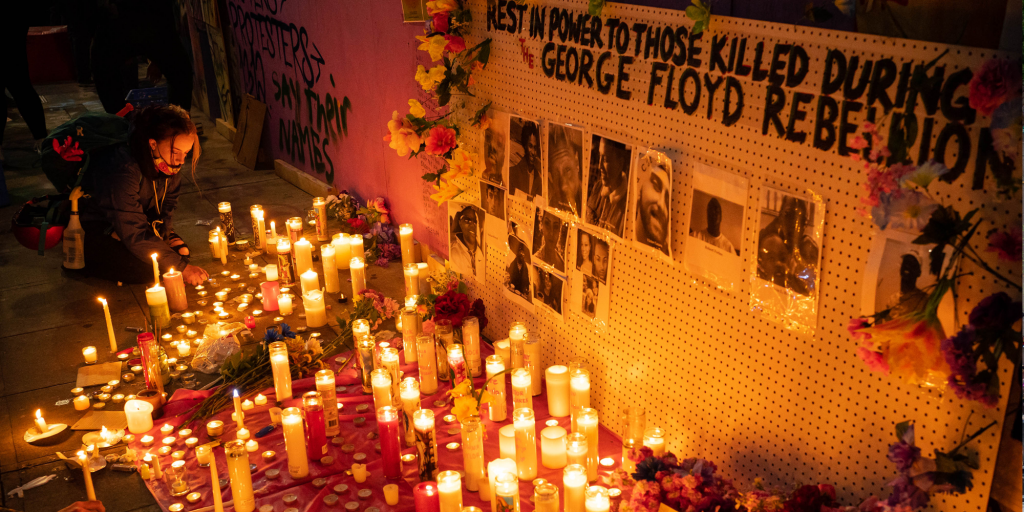
Specific policies have enabled collaboration between the military and the police for decades. Under President Johnson, a new agency called Law Enforcement Assistance Administration (LEAA) spent a billion dollars, or around 1 percent of GDP, annually for ten years, putting the helicopters and military-grade weapons we are seeing today in the hands of the police for the first time. Under President Clinton, the force was dramatically expanded, and the “1033 Program” transferred excess military equipment to civilian law enforcement (activists are now calling to repeal the 1033 Program). These policies opened the door for a vast expansion of the military industrial complex that’s driven by the profits of giant multinational defense contractors, and thrives on the exploitation of black and brown communities at home and abroad.
This collaboration is also psychological. In a widely viewed John Oliver episode, David Grossman, an army veteran best known for conducting police training sessions, was featured, telling police, “You’re a predator. What does a predator do, they kill. Only a killer can hunt a killer.” The seemingly indiscriminate use of “kettling,” tear gas, flash bangs, and rubber bullets that have maimed and killed innocent bystanders during recent demonstrations confirms that police have been predisposed to treat the public as the enemy.
It’s good policy practice to listen to those most impacted by an issue when crafting policy solutions. Listen to black people, disproportionately impacted by police violence, when in concert they call to defund and demilitarize the police. Maybe we can begin to question the hundreds of billions spent on such force abroad, too. It may seem radical to some, but I think training and arming our public servants to be at war is much more radical.
The More Things Change, the More They Stay the Same
by Anthony Walsh, senior policy associate
The only difference between the 2020 murder of George Floyd and the many lynchings of the Old South was the absence of a rope. It seems like the more things change, the more they stay the same. The hate and vitriol toward blacks in America did not end with the collapse of the vile institution of slavery. The American brand of racism, in particular, is a virus that has never been suppressed. Poverty, over-policing, and chronic health problems—all concentrated in neighborhoods now wracked with desperation—are the manifestations of this contagion. We cannot break the fever unless we remove the infection. Eradicate the disease, and the symptoms too will vanish. It is not enough to not be racist. We must be anti-racist. Every day, we must actively work to dismantle systemic racism, otherwise, this cancer will continue to fester. The remedy for a united America is simple. Live, breathe, eat, sleep, and drink anti-racism.
All of Us Must Act
by Jen Mishory, senior fellow
In Michelle Obama’s response to the horrific murder of George Floyd, she called on everyone to be a part of rooting out racism, “no matter how well-meaning we think we might be”—and, as a part of that, to engage in self-examination and listen to people whose lives are different than ours.
Police violence against Black people in this country and the racism and systemic discrimination across our society are long-standing, cruel, and pervasive injustices that require sustained action from all of us.
Obama’s words remind me, and should remind (white) people like me, that as we resolve to do more to fight racism in this country—in our own communities, and in advocating for change in the policies that underlie social systems and institutions such as policing, education, health care, and voting, to name a few—that we must do so with introspection, humility, open ears, and urgency.
Perfectibility, Not Perfection
by Thanassis Cambanis, senior fellow
America’s moral leadership in the world never depended on a claim to perfection. For hundreds of years, America attracted immigrants and inspired citizens because of the opportunities it offered—not the least of which was the chance to be heard and make change.
The revolutionary elite that created this nation embedded hypocrisy and racism in the foundations of their newly United States of America; but these flaws were far from exceptional. What has distinguished America from other nations during the course of its brief but tumultuous history is its capacity to change, sometimes quickly and radically.
Our national story is not that this country is ideal, or even that it lives up to its ideals. Our national story is that the United States has proven capable of reinventing itself, and that it takes its founding credos seriously.
The racists and slaveowners among the Founders might not have believed that all people were created equal. But by espousing that idea in the Declaration of Independence, the Founders made it possible for America to move toward equality and rights. America’s claim to uniqueness lies not its flaws, but in its aspiration to overcome them, even if the nation’s fitful progress has often relied on bloodshed and struggle.
The gift of invention and reinvention cuts both ways; America can slip backward just as dynamically as it can surge ahead. George Floyd was murdered by unaccountable, militarized police, strutting over the rights and bodies of black Americans just like the praetorian guard over the subjects of an authoritarian dictatorship. America’s police have forgotten that their duty is to serve America’s people.
In past crises, the United States has drawn back from chasms of abusive governance to create new deals and great societies that served as beacons to lovers of human dignity worldwide. It can do so again now—so long as people of conscience doggedly maintain the pressure, on the streets, in the state houses, in Washington, and in the voting booth.
Bad Apples
by Casey Berkovitz, senior communications associate
People who defend police as an institution in the wake of extrajudicial killings are fond of saying that killer cops are “bad apples.” Rarely do they connect the turn of phrase with the full saying: “A few bad apples spoils the bunch.” This is undeniably true when it comes to law enforcement violence: officers like Thomas Lane, J. A. Keung, and Tou Thao could have stopped the murder of George Floyd and did not.
But it doesn’t apply just to law enforcement. More broadly, we are all called to not be spoiled by the bad apples in our respective bunches. As family members, friends, and coworkers, our moral duty is to call out racism, discrimination, and prejudice—when it appears as individual sentiment as well as in its systemic effects—when we see them.
As policy researchers and advocates, we must also take up this ethos in our own work. A net increase in school funding that increases police presence in predominantly Black and brown schools? That’s a spoiled bunch. Workforce training programs that formerly incarcerated people aren’t eligible for? Spoiled bunch. Cap-and-trade environmental programs that reduce emissions, but only in white neighborhoods? Spoiled bunch.
When we allow the policy areas that we are experts in, and most passionate about, to be siloed, we are allowing the bad apples of conservatism, inequality, and structural racism to run rampant outside of those narrow silos. As advocates for equity, we must stand against racism and inequality in all areas—for if we don’t, the rot will surely spread to all of our institutions.
On Questioning Police and Reimagining Public Safety
by Olivia Chan, health care policy intern
Every Black life lost at the hands of police and white supremacy is a sobering reminder of the racism that remains ingrained in American society and governance. Every reckoning is an opportunity to question the beliefs that support oppressive systems—beliefs that hinder us from challenging those structures and reimagining what it means for our communities to be safe.
American police forces have their historical origins in slave patrols, from a time when Black Codes were enacted to encourage white vigilante justice, empowering everyday white citizens to surveil and punish enslaved people and Black existence. Our system of policing was used to squash labor movements as well as any resistance to the very racial and class hierarchies the police reflected and reinforced. This system has, over time, helped build a carceral state that disproportionately harms and perpetually punishes people of color, despite lukewarm attempts of reform.
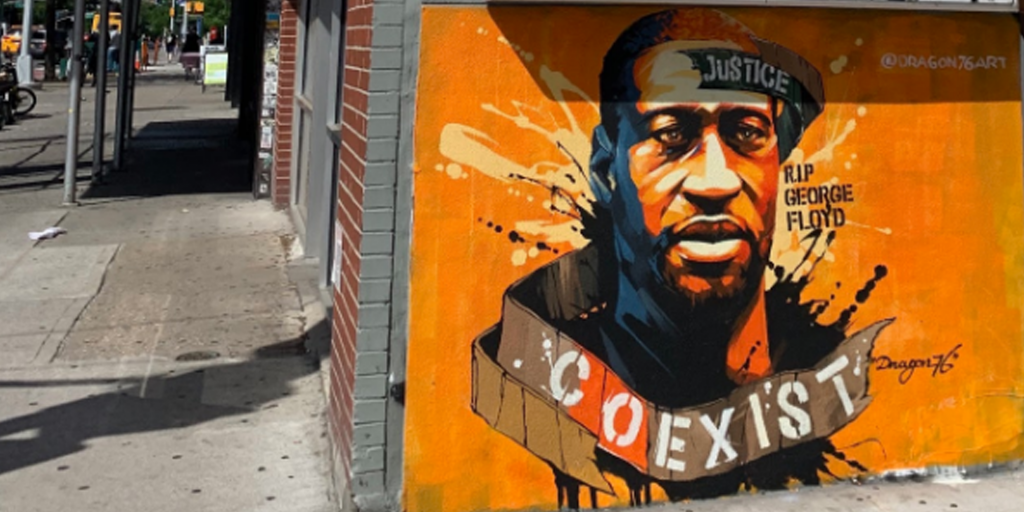
I’ve seen certain unquestioned beliefs obstruct many Americans from seeing the relevance of these historical lessons: the belief that police deserve unconditional respect; that they are the establishers and keepers of “law and order;” and that their determination of law and order is inherently good. These beliefs are especially easy to harbor when you have never had a negative, dangerous experience with police; and these beliefs are often even weaponized, when people invoke the police when they do not approve of a Black person’s behavior—at the risk of that person’s life. With the stakes so high, more people need to ask: Why do police have legitimate power and license to assault and kill? Who do they protect and serve? Who’s safety is valued more in this country?
When people dismiss police killings and violence saying that “the officer feared for his life,” people must evaluate why they are quicker to believe police over Black voices. This dismissal speaks to why we say Black Lives Matter. Why are people quicker to sympathize with and value police lives over Black lives?
And, in the wake of police violence on abundant display during the protests, people who condone this system should ask themselves: What makes you speak up more for protecting property than the dignity of a man’s life? Why is state-sanctioned violence acceptable simply because someone has broken curfew? Why is it okay for the police to escalate violence with tear gas and rubber bullets—to the point that people are losing their eyes or their lives—against unprotected protesters who are simply exercising their First Amendment rights?
Perpetuation and defense of police violence is systemic. Deconstructing our country’s unqualified faith and trust in police is a vital step, if we are to ensure safety and prosperity for all. We must challenge the belief that investing more in policing produces a better society, and instead begin listening to the public health research that shows that safer communities require more resources in other areas: investment in youth, housing, health, parks, job training and better wages, and other social determinants of health. Our vision for public safety must not rely on police.
What’s In a Name? Our Humanity.
by Danny Weiss, senior fellow
There is much to think about, listen to, feel, and do as we come together in protest for racial justice but try to stay apart in a global pandemic. Amidst the swirl, I have been thinking about the importance of recognition.
Back when I heard David Byrne close his American Utopia tour with a riveting rendition of Janelle Monae’s haunting 2015 protest song, “Hell You Talmbout,” which recounts the names of black men and women killed by the police, it caused me to think about why it is so important that we say their names, and it’s stuck with me ever since.
We say their names, of course, to keep their memory alive and to pledge that they will not have died in vain. Monae’s song reminded me of the long tradition in Latin America of saying the names of people murdered by the military or police. Someone calls out a name, like, “Rodrigo Rojas!” a 19-year-old Chilean who grew up in Washington, D.C. and was burned alive by the military in Santiago in 1986, and the crowd calls back, “Presente,” and the speaker replies, “Ahora … y siempre!” (Present, now and forever). “The main idea is that we will not allow his or her memory to disappear, we will not let violence and death have the last word,” says Ariel Dorfman, acclaimed author and himself a victim of General Pinochet‘s dictatorship.
There is another reason to say people’s names, and that is to recognize them as human beings. Recognizing another person’s humanity makes it less likely we will commit physical or economic acts of violence against them. We recognize that we share some basic experiences, like falling in love, being in a family, having aspirations, feeling pain, and facing challenges. As my friend the Reverend Julia Jarvis puts it, calling people by their names is another way of saying “they matter.”
There are serious structural changes and reforms America must undertake now to end racial and economic injustice, from policing, to education, health, housing, and employment. But one of my responsibilities as a white man, especially at this moment in time, is also to listen and learn, and to support the movement for change that is spreading fast, far, and deeply through the country. For people like me, that includes paying attention to those around us, who we exist with, ride the bus with, stand next to in the store, meet on the street, sit across from at work. To say, “I recognize you. It matters to me that you succeed. I cannot walk in your shoes, but I care about what happens to you.”
Black lives matter. George Floyd’s life mattered. Say his name! Say her name! Say their names! And let’s also say the names of the people living around us, now, to recognize their humanity, build community, and stop the killing.
